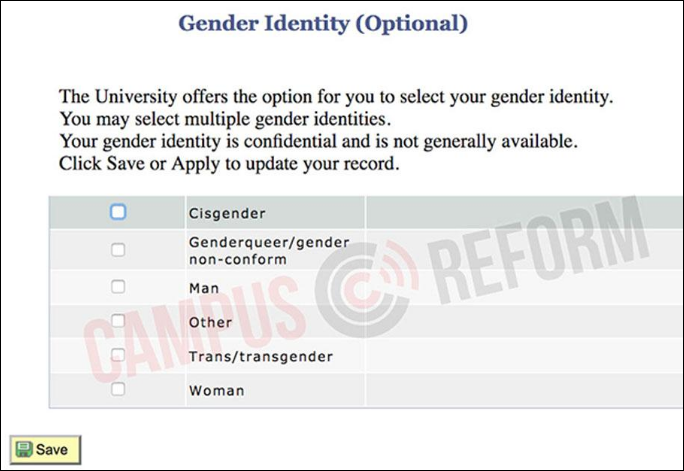PRINCETON, N.J. – Students at Princeton University can now “identify” as one or more of six different genders on the school’s TiberHub student services interface, though it’s unclear how exactly the information is used.
“Students use TiberHub to provide the University with personal information on a confidential basis,” a Princeton spokesman told Fox News. “This information includes emergency contacts, their preferred name, and if they wish to provide it in response to an optional question, the gender with which they identify.”
MORE NEWS: Know These Before Moving From Cyprus To The UK
They can also “identify” as more than one of the following: Cisgender, genderqueer/gender nonconforming, transgender, man, woman, and other.
“You may select multiple gender identities,” according to the website.
Campus Reform reports:
The form states that “[y]our gender identity is confidential and is not generally available,” but does not indicate how the information will be used.
The new form was apparently added unannounced; at the time of publication, there was no statement regarding it published on Princeton’s website, nor was there any notification emailed to students. The exact date when the update was made is not clear.
Neither the Office of the Registrar nor the media inquiries office responded to Campus Reform’s request for comment.
The site notes the new, optional question follows guidelines issued last fall by the school’s Office of Human Resources for “gender-inclusive language in official HR communications, policies, job descriptions, and job postings.”
Several portions of the directive, however, were redacted by school officials following a public backlash they blamed on “misinterpretation and incorrect media reporting.”
Regardless, Princeton is only one of about 54 U.S. colleges that allow students to choose their genders without documents or medical records to back it up. Eleven universities also allow students to choose their preferred pronoun for course rosters, CampusPride.org reports.
MORE NEWS: How to prepare for face-to-face classes
“The point is for students to be able to be gendered in keeping with how they identify and not have faculty members or others misgender them,” according to Genny Beemyn, transgender policy clearinghouse coordinator for the site told The Washington Post.
The “designated pronoun” policies, of course, haven’t gone unchallenged.
University of Michigan junior Grant Strobl, chairman of the school’s Young Americans for Freedom chapter, decided to take matters into his own hands to protest the “absurdity” of his school’s new pronoun policy.
“When I realized that the university decided to live a fantasy of allowing students to insert words that aren’t even actual pronouns into the university online database that updates the rosters, I decided, well, I might as well be the king of that fantasy, and I henceforth shall be referred to as His Majesty,” Strobel told Fox News in October.
“The more and more we go down this road of political correctness at these universities,” Strobl said, “the question is: When will that end? How much is the university willing to sacrifice its pursuit of truth and its mission for this fantasyland of political correctness?”


Join the Discussion
Comments are currently closed.